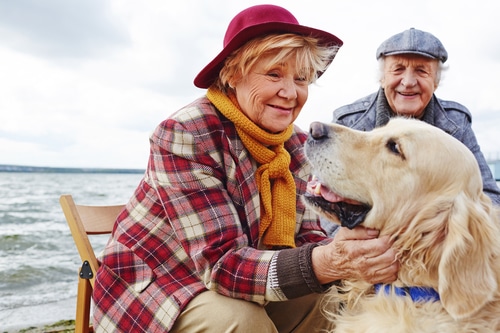
We have all heard the line about dogs being man’s best friend – and they really are, which is why they are so well loved!
But what about when you start to age?
Is it a good idea to have a companion dog in your senior years?
If we could scream out YES to the world – that would be our answer. We know that dogs can help seniors in so many ways – and seniors can help rescue dogs in so many ways too.
It is a win win to pair seniors + dogs together!
Let’s talk about all the awesome-ness that comes from having a dog when you are a senior and how to choose the best dog for your lifestyle, age and health.
What Companion Dogs Can Offer Seniors
Improve Your Mental Health
The kids are gone. Your career has ended. Retirement has begun and you are feeling a little lost and lonely. Without “purpose” seniors may feel a little detached from the world or start lose their self-esteem.
By bringing a dog into your life – you will have a purpose that will reward you with love and kisses! Studies have proven that animals help seniors alleviate depression and minimize that feeling of isolation that come from this stage of life.
Improve Your Physical Health
This has been one area that has had many studies done and the results are overwhelmingly positive. There has been countless studies on the health benefits of owning a pet in the senior years and they consistently show some great health benefits including:
- Lower blood pressure
- Decreased risk of cardiovascular disease
- Reduction in stress levels
- Healthier heart
Dogs specifically offer more physical value because of their need for exercise! Even older dogs need some level of exercise such as a short walk around the block or a game of ball in the yard.
Safety & Security
It has been shown that if a potential thief hears a dog barking the chance of your home being robbed is reduced. If you have limited hearing – the sound of a barking dog may be a good way to get that extra sense of security if you live alone.
What The Research Says
There has been a fair share of research to validate how dogs can help seniors, so if you are uncertain of the benefits then look no further than to some of the studies below.
This is just a small portion of many studies done that cover a variety of areas from social to health benefits!
- Research done by the University of Lincoln and Glasgow Caledonian University found that dog owners actually took 2,700 more steps than their non-pet owning peers. They also walked an additional 22 minutes per day. This was a small study, but showed clearly that dog ownership for the long term will potentially improve their health.
- In another study it was shown that people with pets had a significant improvement in cardiovascular and behavioral benefits. Allen K, Blascovich J, Mendes WB (2002)
- Increased social support from owning a pet can do a better job of lowering mental stress than ACE inhibitor therapy. Allen K, Shykohh, Izzo JL Jr. (2001).
- Owning a dog can bring more social interaction which can reduce those feelings of isolation that seniors can have. In one study walking with a dog proved to increase social engagement with strangers and encouraged interactivity. McNicholas J, Collis GM (2000).

What Seniors Should Consider Before Getting A Dog
There are a lot of things to consider when deciding on whether to add a dog to your senior household!
Here are some questions you should think about to help you decide if a companion dog is right for you!
- What is your current health situation?
Do you have lung issues, allergies, trouble walking or some other ailment? Be realistic about what you can physically handle. If you are 70 years old and walk with a cane, then a 80 pound 2 year old Labrador is probably not the best fit no matter how much you love labradors. - Is your current residence animal friendly?
If you live in your own home of course that offers you more options, but if you live in an apartment or condo you may have limitations and pet restrictions you need to address. - Does your financial situation afford a pet?
Pets need a lot of financial care from vet visits to food to toys. While there are some resources that offer assistance to those in financial need – it is better to ensure you can care for the animal without outside help. - Senior Resources
Do you have a plan in the event you do unfortunately become ill? Is there a designated person who will care for your pet or take them in if needed. The last thing a senior should have to worry about in those times where their health needs to come first is what will happen to their beloved pet!
Other Dog Friendly Options To Consider
So what if you realize that having a dog may just not fit your lifestyle right now but you still want the benefits and fun and love that a dog brings? Maybe financially you are not feeling ready – or your health may not be the best and you do not want the long-term commitment that comes with pet ownership.
There are options!
Volunteer At A Local Shelter
There are shelters everywhere – so why not become a volunteer! You can go when you feel like it and help take care of the animals – from cleaning and feeding to walking and playing. Help the shelter with events and fundraisers – and so much more, they are always looking for help with a variety of day to day chores.
This is a great way to give back to your community, be more social and of course – get those puppy kisses and love that you are looking for!
Become A Pet Sitter
Yep – the internet makes this easy now! You can earn money and care for pets!
Websites like DogVacay offer you the opportunity to list yourself as a pet-sitter and define criteria for the pets you want to host in your home. This is a great option to love on some dogs without the permanent responsibility of pet ownership while earning a small income.
Foster A Dog
Maybe you are not ready for a long term pet commitment!
Maybe financially you feel you may be overwhelmed by the cost of caring for a dog!
How about fostering instead?
When you foster a dog you are opening your home to a homeless dog that needs a safe comfortable place to rest their head. Many dogs are in foster homes – and these homes help get them ready for their forever families.
Fostering offers seniors and the elderly the opportunity to have a dog in their home while having all the fees covered including health care and food. All that is required is lots of love, some training and the ability to help the rescue find a forever home for the dog!
You can reach out to any local animal rescue – most are in constant need of great foster homes.
Finding The Best Dogs For Seniors
So if you think you are ready – and want to take the leap into dog ownership as a senior, here are some thoughts on what to consider before selecting a dog for seniors and the elderly!
Mutts/Mixed Breed
These are the best of the best in our opinion and rarely get mentioned on any lists. Mutts are often healthier than their purebred counterparts and typically adjust more easily to a variety of living conditions due to breed specific traits being minimized.
For example a purebred dog that may be known for herding will have that desire to herd be minimized if they are mixed with another breed. Mutts or mixed breed dogs are also more readily available and are often found in shelters so there are a large amount of options at adoption fee rates!
While we have seen a lot of articles touting “this breed” or “that breed” as best for seniors – we do not think this is good advice. There is no “right breed” based on a whole demographic. The right breed is a unique dynamic based on YOUR unique family and situation.
Senior Dogs
Senior dogs are often over-looked in shelters because no one wants an “old dog with issues” – but often the dogs still have a lot of healthy and happy life left. Sadly, many dogs are dumped into shelters after many years as a loyal family member because the families do not want to have to deal with the issues an old dog brings or they want to trade in their old dog for a new puppy. This is heartbreaking.
We are confident that the joy of a senior adopting a senior will fill your heart! Senior dogs may have medical issues that need addressing – but the rewards and love you will receive in return are priceless.
Senior dogs are less active which is often a good thing for less active seniors. They are also “set in their ways” meaning you know what you are getting personality wise. Puppies undergo so many changes in those first years and you may wind up having a dog that is too hyper or strong willed for your personal needs.
Medium To Larger Sized Dogs
This one may surprise you but we have seen and heard of way too many stories of small dogs getting under foot and causing injuries to seniors. For the elderly sometimes seeing dogs that are small is a problem where as their larger counterparts are easier to see and hear.
Larger dogs – especially seniors often need less exercise than some of their smaller counterparts as well making them a great choice for seniors.
Many smaller breeds which typically make it onto those “best dogs for seniors” lists are often way too yappy, can be hard to training and often need more exercise than their bigger counterparts making them less than perfect for senior lifestyles.
Purebred Dogs
If you really have your heart set on a purebred dog – we hope that you will do your homework before making the leap! Make sure you understand their temperament, how easily they can be training and how much medical care they may need.
Try to look for local rescues that specialize in the breed you are looking for BEFORE you go to a breeder. You may be surprised on what you can find in a rescue! You will be saving a life and saving money – can you say WIN! WIN!
The Risks of Dog Ownership As A Senior
While most of the studies and general consensus of dog ownership as a senior is positive – as with anything in life their are some risks and downsides to owning a dog as a senior.
- Sometimes losing an animal can have devastating mental effects on seniors. Because seniors sometimes feel lonely to begin with – losing a pet can strengthen that feeling of loneliness.
- Injuries that require hospital visits average 87,000 per year – and for those over the age of 75 that can result in more sever injuries like fractures.
Senior For Senior Programs
This is one of our favorite things ever! Many shelters and rescues have special programs to assist in placing homeless senior dogs with senior citizens – and we could not be more thrilled about it. By creating these programs they are promoting the benefits of adopting senior pets (typically 6 or 7 years of age and above) – like the deeper connection that often takes place and the home manners they often have!
If you talk to your local rescue you can see if they have this program in place – if not, maybe you can offer to help start one! Pets for the Elderly is a great organization that is leading this type of adoption and placement and is worth checking out!
Final Thoughts
So – overall the positives out weight the risks for dog ownership as senior! We would love to hear your stories – good or bad about owning a dog in those later years. Is there a breed you love for seniors? Has a dog done something amazing for you or an elderly person you love? Bark at us below!

